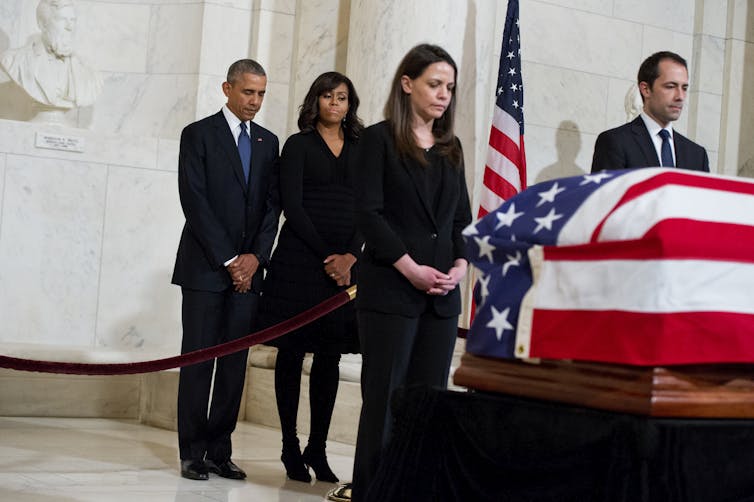The U.S. Supreme Court docket has all the time dominated on politically controversial points. From elections to civil rights, from abortion to free speech, the justices ceaselessly weigh in on the nation’s most debated issues.
And due to the court docket’s affect over nationwide coverage, political events and curiosity teams battle fiercely over who will get appointed to the excessive court docket.
What we discovered: Politics has a a lot stronger presence in articles right this moment than in years previous, with a notable improve starting in 2016.
When public goodwill prevailed
Not many circumstances have been extra necessary prior to now quarter-century or, from a partisan perspective, extra contentious than Bush v. Gore – the December 2000 ruling that stopped a poll recount, leading to then-Texas Governor George W. Bush defeating Democratic candidate Al Gore and successful the presidential election.
Bush v. Gore is especially attention-grabbing to us as a result of 9 unelected, life-tenured justices functionally determined an election.
The New York Instances story in regards to the Supreme Court docket’s choice in Bush v. Gore indicated the justices’ names and votes however neither the get together of the president who appointed them nor their ideological leanings.
Screenshot, The New York Instances
Surprisingly, the court docket’s public help didn’t endure, ostensibly as a result of the court docket had constructed up a adequate retailer of public goodwill.
For instance, the New York Instances case protection indicated the justices’ names and their votes however talked about neither the get together of the president who appointed them nor their ideological leanings. The phrases “Democrat,” “Republican,” “liberal” and “conservative” – what we name political frames – don’t seem within the Dec. 13, 2000, story in regards to the choice.
A recent political court docket
It might be practically unimaginable to learn up to date articles in regards to the Supreme Court docket with out getting the impression that it’s simply as political as Congress and the presidency.
Take February of 2016, when Justice Antonin Scalia unexpectedly died. In fact, justices have died whereas serving on the court docket earlier than. However Scalia was a conservative icon, and his demise might have swung the court docket to the middle or the left.
How the politics of naming his successor performed out after Scalia’s demise was unprecedented.
President Barack Obama’s nomination effort to place Merrick Garland on the court docket had been stonewalled. The Senate majority chief, Republican Mitch McConnell of Kentucky, stated the Senate wouldn’t think about any nomination till after the presidential election, 9 months from Scalia’s demise.
Republican candidate Donald Trump, seeing a gap, promised to fill the emptiness with a conservative justice who would overturn Roe v. Wade. The court docket and the 2016 election grew to become inseparable.

President Barack Obama and first woman Michelle Obama pay respects to Justice Antonin Scalia, whose 2016 demise introduced lasting change in newspaper protection of the court docket.
Tom Williams/CQ Roll Name by way of Getty Photographs
Scalia emptiness modified the whole lot
The day after, 10.48.
How tales body one thing shapes how folks give it some thought.
If an article frames a court docket choice as “originalist” – an analytical method that claims constitutional texts ought to be interpreted as they had been understood on the time they grew to become regulation – then readers may consider the court docket as legalistic.
We present in our research that when folks learn an article a couple of court docket choice utilizing political frames, court docket approval declines. That’s as a result of most individuals want a authorized court docket relatively than a political one. No surprise polls right this moment discover the court docket with precariously low public help.
We don’t essentially maintain journalists chargeable for the court docket’s dramatic decline in public help. The larger situation often is the court docket relatively than reporters. If the court docket acts politically, and the justices behave ideologically, then reporters are doing their job: writing correct tales.
That poses one more drawback. Earlier than Trump’s three court docket appointments, the bench was recognized for its relative stability. Generally choices had been liberal; different instances, conservative.
In June 2013, the court docket offered protections to same-sex marriages. Two days earlier, the court docket struck down a part of the Voting Rights Act. A liberal win, a conservative win – that’s what we’d count on from a authorized establishment.
Right now the court docket is totally different. For many salient points, the court docket helps conservative insurance policies.
If that’s the case, the court docket may have to regulate to its low public approval.



